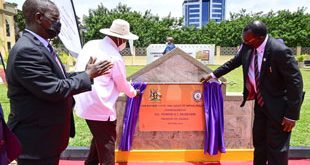
Kampala, Uganda | THE INDEPENDENT | Air monitors at Makerere University School of Public Health are registering an improvement in air quality in Kampala just two weeks after President Yoweri Museveni announced a nationwide lockdown to contain the spread of COVID-19.
The lockdown saw the president banning both private and public transport with the exception of authorized transport for essential workers. Speaking at the World Health Summit regional meeting on Tuesday morning, Prof. Lynn Atuyambe, the head of researchers conducting air quality monitoring and lung health research in Kampala said that his team is now specifically looking at air patterns between June and August, whose report they will release in three months.
However, even before concluding their analysis, Prof. Atuyambe says that they have already noticed reduced pollution levels.
In their project, the Eastern Africa Global Environmental and Occupational Health Hub (GEO Health-Hub), the researchers started air monitoring in 2018 and released data last year showing stuck variations in the air quality at different hours of the day.
Discouraging jogging during these hours, Prof. Atuyambe says air pollution is at its peak at 9 am in the morning and 10 pm in the evening.
Prof. Engineer Bainomugisha, the head of AirQo, another air monitoring and analysis entity says that they have started developing low-cost censors that will include digital platforms to enable communities to report pollution events since it is highly localized.
Questioning whether improved air quality in the previous lockdown last year and what they are starting to see is entirely a result of traffic flow and emissions from vehicles, Dr. Kenneth Arinaitwe, a Makerere University-based researcher said the monitors need to look beyond vehicles.
He says considering that some Kampala roads are not paved and yet the paved ones are not protected from harsh weather, there is a need for analysis to check whether vaporization of dust does not contribute to high pollution in the city.
He however recommends constant monitoring of vehicles for emissions. Prof. Atuyambe says that they do not have the technology in the country to analyze whether the pollutants are for sure vehicle emissions, dust, roadside cooking or biomass, which can all be sources of pollution.
He says they have collaborated with the University of Colorado to do further analysis but they have not yet received the results.
*****
URN
 The Independent Uganda: You get the Truth we Pay the Price
The Independent Uganda: You get the Truth we Pay the Price

